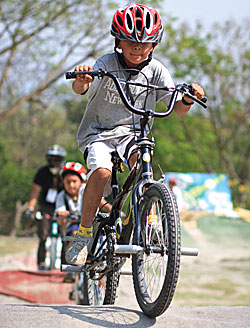 FOO CHEE CHANG |
Young children and youths on mountain bikes of all shapes and sizes speed round a newly constructed 'pump track' at Gyanodaya Residential School, navigating bumps and ramps, having a good time in general while proud parents watch from the side.
This project, in collaboration with the school and sponsored by Kumari Bank, Mountain Dew and retailer Evo Store, is spearheaded by Chain Inc. This is a new collective of mountain bikers that seeks not only to promote cycling, amongst youths especially, but also hopes to bring mountain bikes back from the trails to the commute around the city.
"The country is so polluted and congested. If we can instill an appreciation for nature and create a culture of cycling here, there might still be hope for a reversal," says Chandra Ale, one of the founding members of Chain Inc.
But the task to make cycling an integral and safe part of commuting is an uphill climb here in Kathmandu. An exponential proliferation of motor vehicles on the road over the last 15 years shows no signs of letting up. Nepalis are increasingly dependent on private vehicles to get around, even on short-haul trips. The convenience is apparent, but it comes with the heavy and growing costs of traffic congestion and air pollution.
While poor air quality and the accompanying risks of respiratory illness are of concern to cyclists, wearing a facemask negates it to a certain extent. The chief adversary of cyclists is the general recklessness of road users here, emboldened by the fact that there are few traffic mechanisms to check them. Even when traffic offenders are caught, lax penalties, such as a maximum Rs 200 fine, do little in the way of punishment and deterrence.
For the past 25 years, Sonam Gurung, a pioneering Nepali mountain biker and proprietor of Dawn Till Dusk Mountain Biking, has been trying to lobby for bicycle lanes on the roads. Today, he is well aware that with Kathmandu's narrow roads, compounded by urban sprawl, it is unlikely that bicycle lanes will be created unless there is serious pressure from commuters and road users on the Department of Roads. The cracked helmets from the road accidents that Gurung experienced now hang outside his shop as makeshift flowerpots that speak a grave warning to cyclists who visit.
The Department of Roads, for its part, says that at present there are no plans to install bicycle lanes. Dilli Niraula, superintending engineer at the department, explains, "The roads we have now are too narrow. We are planning to create alternative routes around the valley by bridging the central zone to Ring Road. Once that goes through, we will consider bicycle lanes on Ring Road, which is much wider and more suitable."
Detractors might question the viability of cycling as a form of commuting given the difficulties presented. Further, the cost of a branded mountain bike is comparable to that of a scooter. Consider the advantages however. One can move through traffic faster during rush hour and navigate narrow lanes that motor vehicles have a harder time with. Cycles mean zero emissions for the environmentally conscious and fitness gains for the health-conscious. And from a financial standpoint, one saves on fuel and the availability of affordable Chinese-made bikes with multi-gear systems means you don't have to break the bank.
So the next time you find yourself stuck in a traffic jam, or worse, in a fuel queue, spare a thought for the happy cyclist whizzing past you. If cycles won't solve the Valley's traffic problems, they're certainly a turn in the right direction.


